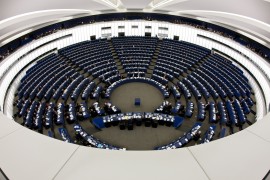
By Richard Corbett MEP
Richard Corbett believes that the EP’s bad press is often down to incorrect information, false assumptions and misunderstandings
The European Parliament is not a “sexy” parliament. Compared to many national parliaments, it lacks the cut and thrust of debate between government and opposition. Like the US Congress, its real work is done in committee. The plurality of languages used makes the debates far from spectacular. For these reasons among others, it gets far less media coverage.
But when it comes to the detail of legislative or budgetary work, MEPs shape legislation in a way that MPs in many national parliaments do not. In some national parliaments, when a government publishes a bill, it is usually clear what will come out of the procedure – it is headline news if the parliament amends it against the will of the government. Some even claim that certain national parliaments are little more than rubber-stamps for their government’s legislation. Such is certainly not the case in the European Parliament. A draft directive really is a draft – MEPs go through it paragraph by paragraph amending it and rewriting it. So do the ministers in the Council – and ultimately the positions of the two must be reconciled in what (since the Amsterdam Treaty) amounts to a bicameral legislature at EU level. But the net effect is that every year, thousands of amendments to draft legislation put forward by ordinary backbench MEPs end up on the statute book and apply in 15 different countries.
In national parliaments being a backbencher, or an opposition party MP, often offers very limited power and little job satisfaction other than the prospect of, perhaps, one day wielding ministerial power. MEPs, on the other hand, whilst not having a career path to a ministry (though a surprising number do become ministers in their member states) can play a significant role in shaping legislation – a classical parliamentary function almost forgotten by some national parliaments.
The nature of day-to-day work is also different. One measure of a good MP in a national context is someone who is a good debater, able to score points over his or her opponents. An effective MEP is someone who is good at explaining, persuading and negotiating with colleagues from 15 different countries.
The European Parliament is part of what makes the EU radically different from a traditional intergovernmental organisation. Indeed, it is only necessary to imagine what the EU would be like without the Parliament: it would be a system totally dominated by bureaucrats and diplomats, loosely supervised by ministers flying periodically into Brussels. The existence of a body of full-time representatives in the heart of decision-taking in Brussels, asking questions, knocking on doors, bringing the spotlight to shine in dark corners, in dialogue with their constituents back home, makes the EU system more open, transparent and democratic than would otherwise be the case. MEPs are drawn from governing parties and opposition parties and represent not just capital cities but the regions in their full diversity. In short, the Parliament brings pluralism into play and brings added value to the scrutiny of EU legislation.
It also takes the edge off national conflict. The Council can all too often give the appearance of decision-taking by gladiatorial combat between those representing “national interests”. Reality is more complex and the fact that the Parliament organises itself not in national delegations but in political groups shows that the dividing line on most concrete subjects is not between nations but between political viewpoints or between sectoral interests.
Despite the significant and growing role of the European Parliament, turnout in European elections has remained low; and even declined to 50 per cent of the electorate in the 1999 election. Although this is higher than, for example, US Congressional elections (48 per cent in 1998), it remains below that commonly experienced in EU member states for national parliamentary elections. (Although these too have been declining in some countries.) This is likely to remain the case for a number of reasons. First, European elections will remain less significant for day to day issues of immediate concern to voters than national elections. Second, there is no government directly at stake in European elections and the bulk of the electorate is used to voting in national elections to keep or throw out a national government. Third, the EU institutions are inevitably more distant than national or local institutions and, as in other federal-type systems, will usually have a lower turnout at the “federal” level (e.g. USA, Switzerland). Fourth, the lower media coverage of the European Parliament alluded to earlier. Fifth, the consensus-style decision-making at EU level which often prevents partisan alternatives from being highlighted to the electorate.
Finally, however, there is the widespread lack of understanding as to how the EU institutions actually operate. In some countries (and none more so than the UK) a significant proportion of the press is overtly hostile to the EU, but in all countries there is an abundance of incorrect information, false assumptions and numerous misunderstandings in the media and among national politicians. This is something that, to a degree, can be remedied with better information and explanation – and perhaps a bit less defensiveness about a Parliament that in certain crucial respects compares well to our national parliaments as a pluralistic forum in which legislation is shaped through discussion and compromise. As we look around the world – or indeed at our own European history – we can be proud of what we have achieved with our unique multicultural, multilingual Parliament.
Richard Corbett is a Labour MEP and spokesman for Labour and for the Socialist Group on the Constitutional Affairs Committee of the European Parliament. He can be contacted at [email protected]. The opinions expressed are those of the author and not necessarily those of Federal Union. This article first appeared in The House Magazine (10 July 2000).
